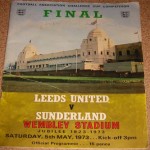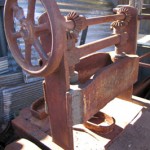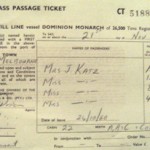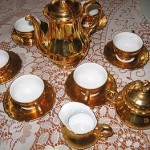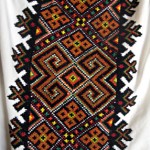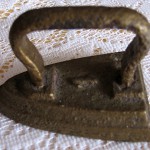Italian
San Ferdinando, Reggio Calabria, Italy
Rome, Italy on 7 March 1948
Darwin on 1 April 1948
With relatives at Farm 285, Toorak Road, Leeton (Riverina region, NSW)
Farming with my father in Leeton.
Stacking fruit for Letona Cannery; railway labourer; brewery worker; farm owner.
I came from San Ferdinando, Reggio Calabria, Italy. I was 18 years old when I left behind my mother, brothers and sisters to meet my father in Australia. He had been in Leeton since 1937 and my grandfather was one of the ‘original’ Italian migrants there in 1929.
We had the intention of everyone coming to Australia for a better life before World War Two but it didn’t work out. During the war we had our farmland and had enough to eat grapes, olives, wheat and corn. I would grind grain in the coffee grinder so that we could have bread.
I left San Ferdinando by train which took eight hours. My brother Pasquale (Pat) came with me to Rome and then I boarded the airplane on 7 March 1948. The war had just finished and there were no ships coming to Australia.
At that time the Australian Government had a policy that a father was able to call a child under 21 years of age and single. My brother Pat wanted to come with me but he was already married. Luckily, he followed after a year.
Dad had sent the documents and permits to be filled in by our local doctor so that I could come to Australia. I thought everything was alright – the doctor ticked everything.
The plane was a four engine, 40 seater. It wasn’t full, there was about 18 of us and I was scared. There were no other Italians on board. I left Rome in the afternoon and slept ’til I got to Pakistan the next day, I think. I changed planes and got to Bombay, India. I was a bit concerned when we landed – they fumigated the plane.
Apparently because Pakistan had some disease, all the passengers were put into a quarantine area in a house out of Bombay. A doctor came every morning to check me and the others. I remember one time I wanted to hang out some washing and I was not allowed. The guard hung it out for me. The food was alright – rice, curries, stews – but sometimes I could not eat because the taste was too different, but I was hungry. There was a servant called Pindo and I asked him by putting my hand to my mouth and patting my stomach if there was any other food. He must have understood because later he bought me a parcel of cheeses and things. It was great!
We were cleared nine days later and I spent another three nights at one of the best hotels in Bombay waiting for another plane. I had sent a telegram to my family in Italy and Leeton to let them know I was alright and would have to stay in Bombay for a while. Apparently my father had gone to Sydney to see where I was but no-one could tell him anything.
From Bombay, I went to Calcutta. We had to wait in Calcutta for another six days for a plane. In that time, another three people came to join the next part of the flight. Two younger blokes, a bit older than me, and their aunty were from Palmi which is [near] San Ferdinando. We stuck together until I got to Sydney. It was wonderful for me to be able to speak to someone.
The next plane was a two engine, 20 seater, and we went through Asia. Every place we stopped, we changed planes. One time I went on an old army plane where we sat opposite each other.
On the first of April I landed in Darwin, Australia. But in Darwin I had to have all the vaccinations done and then wait for another four days to make sure I didn’t get sick. They put us all in a place just outside of Darwin. I remember the old aunty was put in a room on her own and the three of us boys in another with four beds and the old lady would not go on her own. She said she want[ed] to stay with [us].
I had a problem with Customs in Darwin. They were not going to give me my suitcase because they thought I had some illegal items. I couldn’t understand what was wrong. My father had asked me to bring a hatchet (I used it a lot for pruning the fruit trees on all the farms that I worked and owned), a hoe (I used it a lot when I arrived in Leeton), a change of clothes, two ten litre tins of olive oil and a parcel of linen my grandmother had sent Zia (Aunty) Lisa. Customs wanted me [to] pay £5 to get the suitcase back. I didn’t have any money to pay. I wasn’t sure what to do.
During those four days of waiting, me and the boys went looking around Darwin and one of the shopowners asked if I was Italian. We got talking, his name was Mr Del Bardore. I got up enough courage to ask him, “Could you do me a favour?” He said, “If it is possible for me to, I will.” I told him that I needed £5 to pay Customs for my suitcase to be released. He gave me the money. I wanted to show him how grateful I was and gave him a litre of olive oil. He was very happy because it was hard to get olive oil at that time. I got his address so that I could send the money when I could. I did return the money later. It was very good of him to help me.
My next plane was from Darwin to Adelaide, Adelaide to Melbourne, Melbourne to Sydney. Aunty and the boys could have gotten off in Melbourne but they went onto Sydney with me. I arrived just before dark and when I was leaving the airport I had my passport checked by some detectives to make sure I was not an illegal immigrant. The detectives took me, Aunty and the boys to the Sydney railway station.
I had the address of a man from our town that lived in Sydney, Mr Fred Bianchini in Rose Bay, so we got a taxi. When I arrived I asked the taxi driver to wait – I wasn’t certain this was the right house – but when I got to the door I saw Mr Bianchini sitting near the door and I knew I was alright.
He came to the door and asked, “Are you Nino?”, and when I said, “Yes”, he told me that my father had just phoned. He was on the train and would be there in the morning. Mr Bianchini paid the taxi for me and that night Aunty and boys stayed with me at Rose Bay. The next morning Mr Bianchini took them to the airport or station and he paid everything for them. (Mr Bianchini mentioned to me that those boys still write to him.)
The next morning my father arrived and he was surprised and relieved to see me there. I was only eight years old when he left and it was good to see him. He took me into town to buy me some clothes and then we caught the night train at 10pm from Sydney and arrived 11am in Leeton. Dad had called the relatives in Leeton to let them know I had arrived and everyone was at the railway station to meet me.
My father was living with my Nonna (grandmother) Teresa and Uncle Alfonso and his four children in one small house. My father had ten acres of land next to that farm. I started working on the farm the next day. I just wanted to work again, I was sick of doing nothing. I ploughed with the two horses he had, getting the ground ready for tomatoes. My father already had an acre or two of green beans growing for the Letona Cannery. We started to pick and pack the beans into lug boxes [and] took them to the cannery by horse and cart.
After a week or so of sleeping in the lounge room, I said to my Nonna that I didn’t think we could all stay in one house, it was very full. So Dad and I went to sleep in the shed out the back. I put sacks on the walls and covered them with lime and made a room for us. When my brother Pat arrived a year later, I told him to stay with my father and I went down to the other shed which was now empty. I would have a day off on Sundays and would ride a bike into town and go to the movies, cafe, the pub or billiard room.
In 1950, my mother arrived with my brother Fred and sister Domenica, and we moved to a farm in Merungle Hill, about three kilometres from Leeton.
Around four years later, during the canning season, I went to work at Letona Cannery, stacking fruit. Then I worked on the railway in Ganmain and Junee for 12 months. I would put new railway sleepers on the tracks. The money was good: £14-15 a fortnight. We only worked four days a week and would come home for the weekend.
To earn more money, I then went to Sydney to work in a brewery on Broadway for 12 months. Then I came back to buy a farm with my brother Pat off a road which was later named after our family – Farm 328, Rombola Road, Leeton – in June 1958. In 1960 I decided to go back to Italy to get married. I married Carmela Avati – who I knew from the old days – in San Ferdinando and we came back to Australia.
We started our lives on my parents’ farm in Merungle Hill for a year or so and our son Rocco was born. I then went to work in Wollongong for eight years in the steelworks. I did it for the money but I could not get the thought of working on the farm again out of my head. My two girls Maria and Caterina were born in Wollongong.
In 1970, I took the family back to Italy to live as I thought things may have improved and would settle there; I still had some land there. The children went to school but Rocco said he would only stay until he was 17 and then come back to Australia. It was too hard to adjust to life in Italy and we had gotten too used to life in Australia.
I didn’t want to split the family later in life, so I decided we would come back to Australia. We only stayed in Italy for seven months [and] were back in Sydney on January 1971. We returned to Leeton and I then bought a rice farm, which I sold in 1996. We had bought a house in Leeton in 1981 and have now retired and enjoy our children and their children.


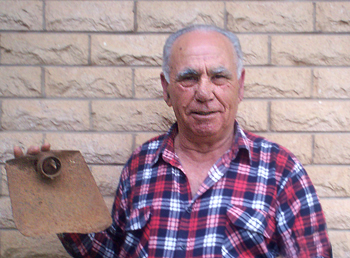


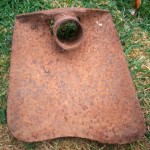
!["My father had asked me to bring a hatchet from Italy but I had a problem with Customs in Darwin. They were not going to give me my suitcase because they thought I had some illegal items [and] wanted me [to] pay £5. I didn’t have any money to pay. A local shopowner gave me the money and I gave him a litre of olive oil. He was very happy because it was hard to get at that time."](../../../cms/wp-content/uploads/2008/10/hatchet-150x116.jpg)
